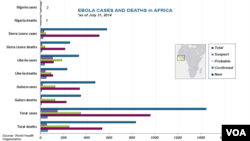As the U.S.-Africa summit unfolds in Washington this week, interviews with two ambassadors demonstrate the challenges the continent faces, including dealing with deadly resurgence of the Ebola virus.
The specter of Ebola has overshadowed months of planning for the U.S.-Africa summit for Liberia, which has been hard-hit by the deadly virus.
Ebola Factbox
Ebola Factbox
Outbreaks of Ebola are life-threatening and in up to 90% of cases, people die.
- In most instances, outbreaks have occurred in remote villages of Central andWest Africa, close to tropical rainforests
- The virus is transmitted to humans from wild animals and spreads human-to-human through exposure to organs, blood and other bodily fluids
- Presently no specific treatment or vaccine is available for people, nor for animals
Content sourced from World Health Organization
Liberian Ambassador Jeremiah Sulunteh plans to use the summit to highlight a desperate need for international assistance. The unusual grip of an Africa virus on a faraway summit illustrates what Sulunteh termed “the alarming situation” in an interview.
“We hope that other leaders in Africa will see this as issue of urgency,” Sulunteh said, in a plea for medical supplies and other regional and international help in combating Ebola.
“The health issue is so alarming that we will want President Obama to look into this critically and also tell other African leaders--and other leaders of the world that this not a Liberia situation, but has a chance of affecting other” countries,” he said.
Ebola has largely hit not only Liberia, but Guinea and Sierra Leone in West Africa. There are great concerns it could become another international epidemic like SARS or the avian flu if not eradicated.
“The virus is something that spreads so fast,” Sulunteh said. “We don’t want it to have a spillover effect in other parts of the continent and in other parts of the world.”
The overarching theme of the summit is investing in the next generation in Africa, backed by a number of other regional concerns. But Ebola has now surged its way onto the agenda from Liberia’s viewpoint.
“While we discuss peace and security, trade and investment and other bilateral issues, the health of the nation is very essential as African leaders have this summit in Washington,” Sulunteh said. “Especially at the rate at which Ebola is spreading in Liberia.”
One of the summit’s “signature events” as defined in a White House document involves investing in African health issues.
“The campaign from Liberia will be on the Ebola issues when we talk about health,” Sulunteh said.
Such health crises require a wide-ranging approach that discussions at the summit can help promote, said Ebrahim Rasool, South Africa’s Ambassador to the United States.
A U.S. aid program called PEPFAR has helped battle HIV/AIDS. Technological advances have been made in the fight against malaria in Africa, he said.
“This summit is at least the recognition that globalization is a comprehensive force,” Rasool said.
A national health crisis becomes a “global emergency” in today’s times, he added.
“You can have the best health early warning system in the United States, but if you don’t pass the …technology to Africa to fight Ebola, you are endangering yourselves as well,” he said.
US assistance
The United States announced last week that it was sending 50 Centers for Disease Control (CDC) experts to West Africa to fight the spread of Ebola.
Rasool said technology, such as satellite tracking can make a long term difference.
“We need to emerge from the summit with a systemic approach,” he said. “It is not just selling drugs to Africa. It’s creating a system that warns you of impending diseases,” he said.
In the meantime, Liberia’s Sulunteh found his country so hard hit by the Ebola virus that last week it was virtually begging for low-tech, basic medical needs.
“This is a national emergency and it needs attention in the way of appropriate medical supplies,” he said.
Doctors, nurses and aides have been hampered by in their efforts because of the shortage.
“There is a need for more strong antibiotics,” Sulunteh said. “There is a need for more safety gear that health care workers can use.”
Liberian President Ellen Johnson Sirleaf is staying home to deal with Ebola crisis in Liberia and “to find the resources to fight Ebola,” Sulunteh said, while he and the rest of the Liberian delegation will raise awareness at the summit this week.
Sulunteh was diplomatic in noting that Liberia is grateful for the assistance from the United States and others.
But Liberia will use the Africa summit to ask the international community to “step up” their efforts, he said.
“The message is to all the African leaders that are coming and President Obama, the host,” Sulunteh said. “They have been helping, but we need more.”







